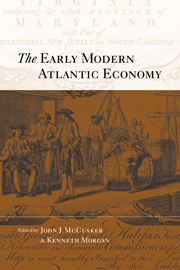Book contents
- Frontmatter
- Contents
- List of figures
- List of tables
- List of abbreviations
- List of contributors
- Dedication
- Introduction
- Part I The role of merchants and their connections
- Part II The development of trades
- 3 Property versus commerce in the mid-eighteenth-century port of London
- 4 Irish businessman and French courtier: the career of Thomas sutton, comte de Clonard, c. 1722–1782
- 5 ‘A revolution in the trade’: wine distribution and the development of the infrastructure of the Atlantic market economy, 1703–1807
- 6 Law, credit, the supply of labour, and the organization of sugar production in the colonial Greater Caribbean: a comparison of Brazil and Barbados in the seventeenth century
- 7 The revolutionary impact of European demand for tropical goods
- 8 The business of distilling in the Old World and the New World during the seventeenth and eighteenth centuries: the rise of a new enterprise and its connection with colonial America
- Part III Imperial economies
- Part IV Colonial working societies
- Index
5 - ‘A revolution in the trade’: wine distribution and the development of the infrastructure of the Atlantic market economy, 1703–1807
from Part II - The development of trades
Published online by Cambridge University Press: 16 October 2009
- Frontmatter
- Contents
- List of figures
- List of tables
- List of abbreviations
- List of contributors
- Dedication
- Introduction
- Part I The role of merchants and their connections
- Part II The development of trades
- 3 Property versus commerce in the mid-eighteenth-century port of London
- 4 Irish businessman and French courtier: the career of Thomas sutton, comte de Clonard, c. 1722–1782
- 5 ‘A revolution in the trade’: wine distribution and the development of the infrastructure of the Atlantic market economy, 1703–1807
- 6 Law, credit, the supply of labour, and the organization of sugar production in the colonial Greater Caribbean: a comparison of Brazil and Barbados in the seventeenth century
- 7 The revolutionary impact of European demand for tropical goods
- 8 The business of distilling in the Old World and the New World during the seventeenth and eighteenth centuries: the rise of a new enterprise and its connection with colonial America
- Part III Imperial economies
- Part IV Colonial working societies
- Index
Summary
In 1807, Marien Lamar, near the end of his tenure as the United States' consul on Madeira, wrote to a relative in Great Britain who had inquired about their family's prior involvement in the Atlantic wine trade. In response, the ageing American agent waded through nearly an entire century of genealogy and history. His family had at times experienced unrivalled success and, at others, crushing failure. His brother's father-in-law, a Maryland physician and planter named Richard Hill, had fallen on hard times and moved to the island in 1739, hoping to revive his flagging fortunes by earning enough in the wine trade to repay his numerous debts, some of which were owed to Madeira's merchants, and provide for his large family. Sons, brothers and nephews from Maryland and Pennsylvania followed him there during the first ten years of his residence on the island, and more distant kin from Great Britain joined the firm in ensuing decades – all to avail themselves of the opportunity of making a large profit from the beverage that was fast earning a reputation as an Atlantic luxury good. Looking backwards over seventy years, Marien Lamar realized that there had been nothing less than a ‘revolution in the trade’ and that his family had been part of this transformation. What was this ‘revolution in the tradet’ the consul and his contemporaries remarked upon time and again, and what was its significance?
- Type
- Chapter
- Information
- The Early Modern Atlantic Economy , pp. 105 - 153Publisher: Cambridge University PressPrint publication year: 2001
- 1
- Cited by

